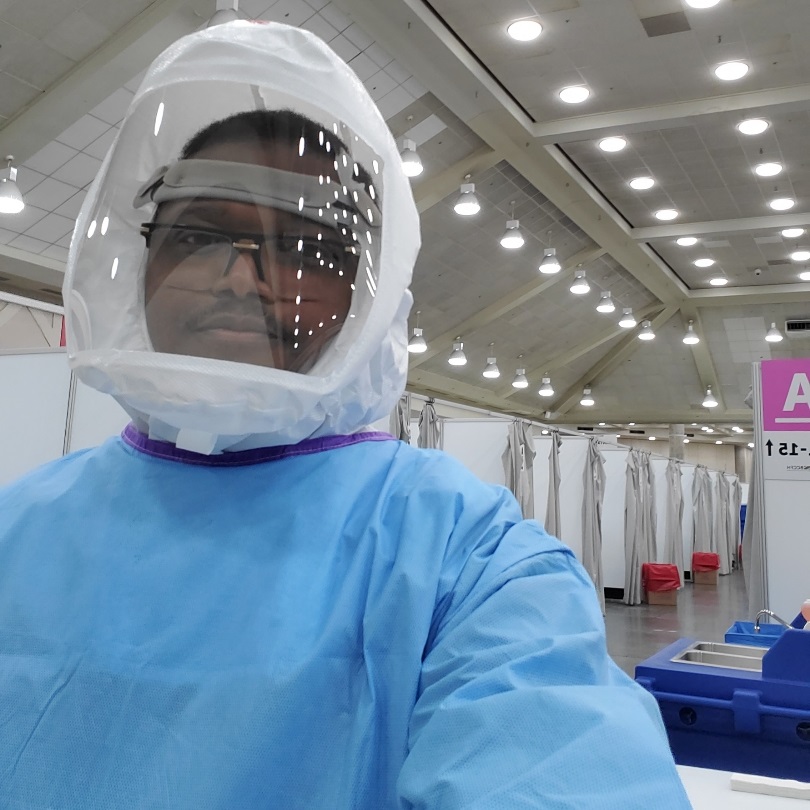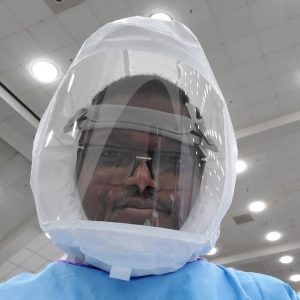Covidist Richardson urges governments to make evidence-based decisions

BALTIMORE / PHILIPSBURG – Countries need knowledgeable leadership and they must make evidence-based medical decisions. That is the message from Lt. Colonel Dr. Leonard (Lenny) Richardson, a COVID-19 researcher from Anguilla who currently works at the Johns Hopkins Hospital in Baltimore.
“The corona-virus is not new; however, COVID-19, also known as SARS-CoV-2 is novel and new to man. We are not COVID-free,” Richardson says. “But the question is: do we keep the world out or do we open up? How else will our economy survive?”
“There is a lot of misinformation about this virus. Some say that it is man-made. With the convergence of gene therapy and germ-line therapy, we now have the ability to edit nature’s software with gene drives such as CRISPR and genome editing. Currently, there is no such evidence of genetic intervention. The question though is no longer can it be done but rather was it done here? The current thought is that the Pangolin, a Chinese sloth, may have facilitated the incubation of COVID-19 which then jumped to humans.”
Mitigating and controlling the risks, reopening the economy slowly until a vaccine is available and educating people are some of the things that need to find their place in a sensible approach to the current crisis.
Richardson also stands behind what many people experience as a mantra: practice social distancing, wash your hands frequently and wear a facemask.
 Richardson has made a distinguished career in the air force and in medicine. At Johns Hopkins he specializes in internal medicine as an intensive care unit (ICU) Covidist, doing research and treating COVID-19 patients.
Richardson has made a distinguished career in the air force and in medicine. At Johns Hopkins he specializes in internal medicine as an intensive care unit (ICU) Covidist, doing research and treating COVID-19 patients.
“We have roughly seven billion humans on the planet and each one of them is different,” Richardson observes. “Even though we have the same DNA, the interaction between the environment, our lifestyles, family predisposition, susceptibility to the disease and immune status all affect the way in which we become sick.”
“The corona-virus has been in existence for a long time, especially in animals,” Richardson says. “But when the genes changed and jumped to humans due to new interactions with animals, such as sloths, it turned into the problem we are facing today.”
The Covidist explains that the corona-virus enters the human cell through interaction with angiotensin-converting enzyme 2 (ACE 2). The SARS-CoV 2 spike (S) glycoprotein binds to the cell membrane protein angiotensin-converting enzyme 2 (ACE 2) to enter human cells. “The virus exploits our own immune defenses to drive infections. The lungs have large amounts of these cell membrane proteins which is why respiratory failure is prevalent in the sickest patients. It is like the perfect key……”
The question is of course since the virus has been around for a long time, why it has turned the world upside down now. According to Richardson, it comes down to the change in the genome.
CRISPR is a simple yet powerful tool for editing these genomes (the set of chromosomes in a microorganism). It allows researchers to alter DNA sequences and to modify gene function. In 2019 the first sickle cell patient received experimental treatment with the CRISPR-technique.
the perfect virus
The COVID-19 virus is, Richardson observes, “the perfect virus: it is highly infectious, it does not kill the host too fast and it has a long incubation period.” It sounds a lot like everybody’s worst nightmare.
Richardson says that the focus must be on protecting the elderly – especially those over 65 years of age. There is a need to monitor patients suffering from COPD (chronic obstructive pulmonary disease), a chronic inflammatory lung disease that causes obstructed airflow. But there are other groups that warrant special attention too, like those suffering from diabetes, hypertension, asthma and obesity. “These underlying issues could be detrimental to those who contract the corona-virus,” Richardson says.
There is yet another problem with the corona-virus. Around 80 percent of those who get infected show no or only slight symptoms but they can be very infectious to others. Around 5 to 10 percent get moderate to severe illness, some requiring critical care. The symptoms range from simple fevers, cough, malaise, diarrhea, loss of taste or smell and swollen toes (now called COVID-toes) to more severe pneumonia, respiratory failure, multi-organ inflammatory syndrome and failure, embolisms or blood clots, cytokine storms, and death.
“Herd immunity was not seen as a short term solution; to achieve herd immunity to SARS-CoV2, 70 percent of the population will need to have been vaccinated or have antibodies. This is much lower than for a disease like measles that is more contagious and requires 95 percent vaccination or immunity,” Richardson says. “Most governments were asking themselves: how many people are we prepared to lose? But it is important to avoid making this a political discussion. I am a Covidist and I have learned to treat corona-patients with new and repurposed drugs like Remdesivir, Dexamethasone, Tocilizumab, Daclatasvir, and Convalescent plasma in new and exciting ways.”
Living in semi-isolation is not a guarantee for protection, as cases in South America have shown. Indigenous groups living in the Amazon jungle are especially vulnerable because they lack a robust healthcare system and they are at risk when they mix with healthcare workers in the cities.
“One of the questions I get asked often is: can someone get infected twice?” Richardson says. “The answer is, yes, but this can be due to different mechanisms of action. Persons that develop new symptoms more than 3 months after the initial infection should be retested. Persons who have persistent or recurrent symptoms should remain isolated and maintain transmission-based precautions as they may still have an active initial case. Not everyone with COVID-19 develops an adequate antibody response to an exposure and we still don’t know how long the antibodies last when they do develop a protective response. This coupled with the fact that the virus mutates, confirms that re-infection is possible so one should remain vigilant.
—
Interview: Terrance Rey (Publisher StMaartenNews.com)
Text: Hilbert Haar in cooperation with Dr. Richardson and Terrance Rey.
###
Publisher’s Note: It was an amazing honor and privilege to interview this good gentleman: Dr. Leonard Richardson, MD. His bio reads as follows: Lt. Colonel (Dr.) Leonard A. Richardson holds an MD degree from Howard University College of Medicine. Following his graduation, Dr. Richardson completed a joint residency training program at Michigan State University, Kalamazoo Center for Medical Studies, and at Howard University Hospital in internal medicine. He then joined the United States Air Force where he served with distinction. As a civilian, he worked as a hospitalist/critical unit physician and started a medical practice, Kingdom Medicine, PA, which has grown to six locations.
He has published a book called “Determined to Practice“. It was published in 2016 and it also addresses the topic of dealing with pandemics. This book is sold via Amazon: https://amzn.to/38bft98
I left the interview feeling hopeful. To overcome this virus, we not only need specialized knowledge and education about dealing with this virus, which is here to stay now, but also inspirational leadership that is knowledgeable and providing information that is evidence-based from a medical standpoint. This good gentleman is the real deal and knows what he is talking about. He had some good advice to share and I will certainly be doing a follow-up interview with him regarding the resurgence of the virus infections.
###
Related articles:
This article has also been published in Dutch, Spanish and French.


























